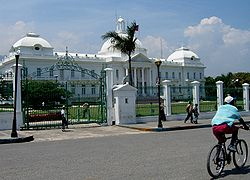The death toll in cholera outbreak affecting Haiti climbed to more than 220 on Sunday as the disease spread to the capital of the earthquake-devastated Caribbean nation, dpa reported.
Officials said three people died in Port-au-Prince and five more there were suffering from the water-borne disease, which has affected 3,000 people in areas to the north.
Officials said the cases in the capital were people who came to Port-au-Prince for treatment, but were infected at the epicenters of the outbreak in the north.
Imogen Wall, a spokeswoman for the United Nations Office for the Coordination of Humanitarian Affairs (UNOCHA) in Haiti, said plans were being worked out to deal with the worsening situation.
Health experts have expressed concern over the impact of widespread infections in the capital or the nearby refugee camps, where hundreds of thousands of survivors from the January quake still reside in rough conditions.
"If the wave of disease reaches Port-au-Prince, where families are living in overcrowded, unhygienic camps, then it will be disastrous," said aid worker Estrella Serrano.
Some 3,000 people were being treated in hospitals, sickened with fever, vomiting and diarrhoea, in the Lower Artibonite region, 80 kilometres north of Port-au-Prince.
The outbreak prompted the government to declare a health emergency across the country late Friday and institute sweeping measures to halt the spread of the disease.
More than 1 million people have been living in tents in refugee camps since the January 12 earthquake in which more than 200,000 people died. Access to clean drinking water at those sites is limited and delivering supplies can be difficult.
Experts are baffled by the cholera outbreak, Haiti's first in decades and one that occurred while international health agencies have a beefed up presence in the country.
Haitian authorities fear that recent heavy rains had caused latrines to overflow and displaced contaminated water into the Artibonite River.
Witnesses spoke of thousands of people in the Artibonite region standing on streets and begging for water because they are not allowed to drink river water because of the danger of infection.
Cholera is an intestinal infection caused by bacteria transmitted through faecal contamination of water or food. The main symptoms are diarrhoea and vomiting, which can quickly lead to severe, sometimes fatal, dehydration.
A health and sanitation aid worker in Haiti told the German Press Agency dpa that the outbreak appears to have occurred in a relatively affluent area, raising concerns for other areas with poor sanitation.
Federica Nogarotto, Doctors Without Borders' field coordinator in St Marc, Haiti, where the outbreak was centred, said there were "significant numbers" of cholera patients at the city's St Nicholas Hospital, which lacks "the capacity to handle a cholera emergency."
"The most important thing is to isolate the cholera patients there from the rest of the patients, in order to best treat those people who are infected and to prevent further spread of the disease," Nogarotto said.
Health Minister Alex Larson, who visited the affected region with President Rene Preval on Saturday, appealed to people their to pay more attention to hygiene and sanitary conditions.






